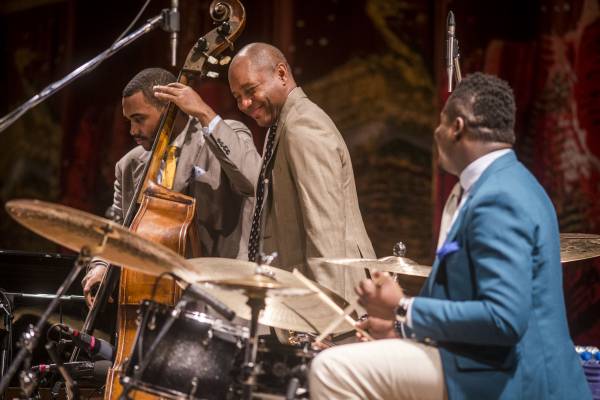City Recital Hall, June 2
8.5/10

They begin at such a whisper they almost have you leaning forward in your seat, and then suddenly spin into the thrills and spills of bassist Eric Revis’s Dance of the Evil Toys – aptly named, given its wicked syncopations. The energy level is instantly blistering, but without the usual connotation of vigour: this is more like dancing on air.
It is eight years since saxophonist Branford Marsalis, a decidedly more open-minded conceptualist than his trumpet-playing brother, Wynton, was last in Sydney, and never has he or his band sounded better. This line-up, completed by pianist Joey Calderazzo, Revis and drummer Justin Faulkner, has been intact since 2009, playing music (from the main channel of the wide river called jazz) with such brilliance that it could easily be overly glossy, were it not realised via bristling imaginations, startling cohesion and this four-way weightlessness.
Where so many tenor saxophonists lean on John Coltrane’s legacy, Marsalis carries more echoes of Sonny Rollins, only he deploys a much lighter tone. Meanwhile his soprano sound, never reedy or nasally, has a bell-like roundness and clarity, and he nodded to the great Sidney Bechet in the singular effervescence lighting up both Andrew Hill’s Snake Hip Waltz and a suitably blithe On the Sunny Side of the Street. Yet Marsalis could also use the soprano to tear at a song’s seams, building almost frightening potency.
The key wonder, however, was the band’s collective capacity to generate black-hole density amid that dancing-on-air quality. Calderazzo’s teeming solos were replete with wit, rhythmic switchbacks and phenomenal buoyancy. Similarly the rhythm section could generate propulsion of pulverizing intensity without the music losing its transparency.
It Don’t Mean a Thing (If it Ain’t Got that Swing) featured one of the most spellbinding drum solos I’ve heard: a jazz version of A Brief History of Time that had Faulkner referencing such greats from the deep past as Baby Dodds and Jo Jones, before unleashing explosive devices of his own around the phrasing of the melody.